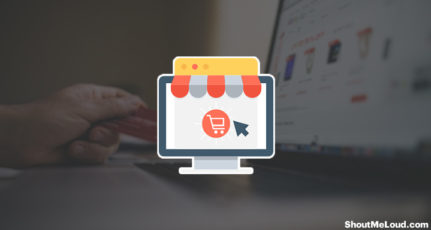A leading information technology research and advisory company predicts that the Indian eCommerce revenue will reach $120 Billion in 2020; a whopping 70% increase over that of 2016. And not very different is the case with global eCommerce.
You must be wondering how this matters to you.
Now imagine your business making just about 0.01% of the projected 1 billion USD. You’ll be earning $100,000.
Now, that’s huge!
Pretty must the annual salary of engineers slogging in the silicon valley.
Going through these stats, I thought – Oh boy. Its got to be really expensive and tough to put up an eCommerce website.
But I was so surprised with how easy it can get. And thats why there are so many startups making their way into eCommerce.
With the surge in eCommerce startups, there is also an increase in the number of tools that let technically naive (yet business oriented) entrepreneurs start, manage and expand their online stores.
In order to withstand the tough competition, an eCommerce store needs to be well designed and well managed.
Hence choosing the best eCommerce platform plays a huge role in the success of your business.
One such tool that carries the motto of making commerce better for everyone is Shopify. In this Shopify Review we’ll see if it stands out as a great eCommerce platform or is just another tool that delivers a half backed cake.
If you have ever bought something online, it is likely that you’ve purchased it from one of 175,000 active Shopify stores. The number shows the popularity of the service. What made so many choose and stick to Shopify? Let’s check out …
What made me believe I can create an eCommerce website?
Creating a successful eCommerce store takes a lot more than just putting up a pretty looking website. Let’s dig deeper into how Shopify fares with the following important aspects of an eCommerce website.
Usability
Shopify’s dashboard could be a surprising relief to people who are not too tech-savvy. Using Shopify is quite intuitive with the website giving a quick explanation of which tab does what in the first login.
Shopify manages to implement advanced eCommerce features while making the whole user experience a cakewalk. Intimidating tasks like enabling a product rating system and many others turn out to be rather simple.
Shopify stands up for the prime purpose of having an eCommerce platform i.e., building an online store with zero coding. At the same time, it also gives access to the code if one wants to play with it.
In short, your eCommerce store will be up and running within minutes. That’s how easy it can get with Shopify’s admin controls.
Storefront Management
A major part of setting up the eCommerce store is designing the website, creating the various pages, and listing the products. This is where one ropes in a web designer and a webmaster shelling thousands of dollars.
With Shopify, designing the website in a breeze. Shopify houses hundreds of free and paid store themes for us to pick from. All we need to do is choose one, install and customize it.
Worried if you’ll have to adjust with a prebuilt theme?
Well, you have the liberty of uploading a third party custom built theme or just modify the code of any existing theme to your liking.
See the below a glimpse of how Shopify gives you the power of modifying your store with no coding/designing knowledge.
https://www.youtube.com/watch?v=N08ftKJ4c1U
Shopify also seems to realize that most new eCommerce websites come with a blog; hence enabling us to maintain a parallel blog with the store. Even the blog can be created and attached to the store with no coding whatsoever. This amplifies Shopify from being just an eCommerce platform to a fully hosted blogging platform too.
eStore Management
Managing the customers preferences, fulfilling orders, managing payments, etc., can be quite a tedious task if not backed by a reliable store management system.
Each of these tasks need a separately designed piece of code embedded in the eCommerce website. Even popular CMSs (Content management systems) like Joomla and WordPress need 10s of plugins installed to accomplish a comprehensive eStore management.
However, Shopify being a CMS dedicated for eCommerce, makes managing an eStore as easy as it can get.
The following major functions of an ideal eStore come inbuilt with Shopify:
- Creating and managing customer profiles.
- Grouping the customer profiles based on buying habits, payment preferences, geographic location, demography, etc. This information can be exported and later used for analyzing trends.
- Uploading product information like images, description, pricing, stock available, etc., and categorizing products in collections.
- Creating and selling customized gift cards for your brand.
- Offering discount coupons as a part of your marketing strategy.
- Checking and fulfilling orders.
- Readymade notification eMail templates to notify customers about order confirmation, cancellation, shipping details, refund notification, order invoice and many others.
- Creating and maintaining a blog (alongside the eStore) for your eCommerce brand with an inbuilt CMS as easy as WordPress.
- Integration to over 70 payment gateways including Google Wallet and Paypal.

eCommerce Website Hosting
Shopify is a fully hosted eCommerce platform. That is, unlike the case with eStores created by platforms like WordPress, you need not worry about hosting your store with a third party service. Shopify takes care of all the hosting needs with no extra costs incurred.
Shopify provides level 1 PCI compliant hosting which comes with 265 bit SSL certificate to keep your customers’ information highly secure. These security features usually come with premium plans of a hosting service provider.
You need no plugins to initiate backups. Shopify takes care of that too with daily backups. You don’t have the hassle of upgrading the CMS or plugins every now and then.
Shopify hosting is by default CDN enabled to ensure your Store runs on jet speed.
Shopify auto updates versions of its CMS while you concentrate solely on managing your eStore.
Linking a branded domain name to Shopify is as easy as its shown below.
https://www.youtube.com/watch?v=xmX1qI39jig
Shopify Apps
Shopify comprehends that not all eStores require every possible eCommerce website feature out there. So it just keeps the must-have features in the core CMS and enables plugging in the extras with the Shopify Apps.
Shopify Apps allow you to extend the functionality of your eStore in myriad ways. The App store houses hundreds of free and paid apps that let you add extra features to your store in the likes of accounts, social media management, newsletter management, currency converters, product reviews, product suggestions, account logins, cart management and many more.
Shopify makes sure that the App store is not filled with all sorts of Apps from every other app developer. The apps that go into the App directory are very meticulously tested by the Shopify team. This avoids listing of pointless apps. See how the process goes.
https://www.youtube.com/watch?v=cOjxYQ_a_u8
Shopify offers all up to date SEO Settings
Optimizing the store for search engines is made very intuitive by Shopify. The CMS allows easy customization of vital areas of eCommerce SEO like store/product tile, descriptions, heading tags etc.
Shopify auto updates and creates XML sitemaps for new and existing products, pages and posts of the eStore.
The Shopify product rating system is fully compliant with Google’s rich snippets. This ensure listing of your eStore items in the first of the search engine results pages, which promises better conversions.
On the marketing front, Shopify provides a $100 Google Adwords coupon to help us kick start with Google advertising.
Support from Shopify
Shopify came into business during the infant stage of eCommerce. Ever since it managed to help thousands of eCommerce startups to establish themselves in their respective niches. This was made possible primarily by the customer support team.
Shopify is known to have the best support team in the industry which is made available 24×7 through multiple channels like live chat, eMail support, toll-free telephone number and a commendable YouTube channel with hundreds of helpful how-to videos.
Shopify also provides access to an active forum and a well written manual. It also connects us to eCommerce experts from around the industry who give us lessons in building a successful business.
Do visit the YouTube channel which gives all the videos the get you started with your eStore. It hosts many inspirational success stories, SEO/marketing lessons, advices from experts and how-to videos.
See below one such Shopify success story.
https://www.youtube.com/watch?v=Dtvu0DdA0bQ
Shopify Analytics
Analyzing the shopping trends in your eStore can help you pitch the right products at the right time to the right set of prospects. Your stores analytics help craft the right marketing blueprint.
Shopify gives every little detail of whats going on within the store like sales, payments, traffic/referral and other useful insights.
Shopify Pricing: Something for everyone
Shopify offers five plans with the starter pack costing $14/month. This allows listing of only 25 products. This plan can be good for minimalistic stores. However the most expensive package called the Shopify plus can cost about $200/month which can be customized for high volume of traffic.
The below three packages are the interim ones, the $79/month professional package being the most popular one. It offers all the above mentioned hosting features with capability of viewing store performance reports and recovering abandoned carts.
Shopify charges 2.9% + 30c per transaction, 2.5% +30c per transaction and 2.25% + 30c per transaction in the basic, professional and unlimited plans respectively.
What I like and Dislike about Shopify?
The fact that you can build a full-fledged eCommerce website with no clue of coding is amazing in itself. But there are Ns such services that promise to deliver the same.
However, Shopify dodges all such services with its well thought system that is not confined to providing a way to setup the site, but also helps manage the store with utmost easy.
Above all, the support provided by Shopify is one of its kinds. Shopify eCommerce University is a great place to learn from the industry’s experts and also learn from success stories of 1000s of startups. This shows that Shopify tries to be beyond a CMS. It in my opinion Shopify is a 360* solution for starting & growing an eCommerce website.
One negligible downside of Shopify is that if you ever want to redo the code of the website, you’ll have to hire a developer acquainted with the new programming language called Liquid. This can be expensive as there are not many programmers skilled in liquid. I say this drawback can be neglected because in my opinion, someone wanting to change the code is quite rare.
What I find a little pricky is that Shopify takes a share of our transactions apart from the monthly fee. It ends up being a partner instead of just a service provider. This may not be much of a concern for some as the charges are around 2.5% of the transaction amount. This again depends on the transaction volume.
and, let me know
What do you think of Shopify ?
Are you ok letting Shopify be your eCommerce partner given that it is so reliable and feature rich?









![How To Build Your First Online Store [Comprehensive Guide]](https://www.shoutmeloud.com/wp-content/uploads/2016/10/How-To-Build-Online-Store-431x230.jpg)
Hello,
By reading this post. I suddenly got the idea to open my own diy store.
Thanks alot for this post. I really appreciate it 🙂
Piyush
Hi Preethi…
does shopify provide logistics support in india ?
Good info. There are 100+ of e-commerce platforms are there on the internet. each and every platform is unique as your business is. Each and every platform has its own pros and cons so do a trial play before choosing any ecommerce platform.
Great review. But I wonder if there is any advantage of Shopify over woocommerce? To me Shopify is pretty expensive and since I don’t know of any advantage over WooCommerce, I will always opt in for Woocommerce.
Hi Odira. Glad you liked the post. You can see the below comparison post on Shopify and WooCommerce to get a better idea.
https://www.shoutmeloud.com/shopify-vs-woocommerce.html
so Shopify is better than wordpress plugin which allow to sell items directly without loosing commission charge
If there is another software or medium providing free eCommerce site platform other than shopify?
Although I like Shopify too for starters.
I want to ask that building an eCommerce site will help for a blogger or not ? Also Whether I can build eCommerce having no product just the promotion of my blog? Please suggest. Thanx 🙂
Hey Abhishek ,
hey Abhishek there are like 3 or 4 companies which helps in making your stores like zepo , build a bazaar , Kartrocket . These three are the Indian brands who makes the e-commerce stores .Shopify being the international and one of the old has an edge over these Indian brands but the Indian companies are improving also . Right now according to me Only Zepo is giving shopify a tough competion in India .
If you want a free store i think that is not possible but yes most of these websites do provide you the 14 days trial if you like then you can pay otherwise not .But as you are saying that you to sell services related to blogging i should say go for instamojo .
Now the last part e-commerce isn’t about selling the goods only . You can sell the services also, snapdeal started with discount coupons and deals. As you are blogger you can sell services like seo tools , seo guides etc .
I hope i have answered all your questions .
Thank You
Thanx Akshay for suggesting and explaining me. Now I got to know what I have to do. Once again thanx.
You can try :
http://www.prestashop.com
virtuemart.net
Woo commerce plugin with WordPress
All are free CMS scripts